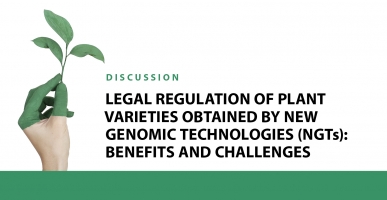Events
LEGAL REGULATION OF PLANT VARIETIES OBTAINED BY NEW GENOMIC TECHNOLOGIES (NGTs): BENEFITS AND CHALLENGES
23 11 2023
Resolution, adopted by the participants of the discussion
LEGAL REGULATION OF PLANT VARIETIES OBTAINED BY NEW GENOMIC TECHNOLOGIES (NGTs): BENEFITS AND CHALLENGES,
held at the Lithuanian Academy of Sciences on 17 November 2023
Lithuanian scientists have developed and tested gene editing technologies and made them available for practical use. New genomic technologies (NGTs) enable making precise changes in the genome, which may be identical to those that occur naturally in nature or through breeding. For this reason, in the USA and other countries, the regulation of genetically modified organisms (GMOs) has for some time been based on the nature of the modifications and the effects they cause rather than the way they were produced. According to the outdated GMO regulation of the European Union, even plant varieties with identical genes can be placed in different grouping categories of species. Such regulation not only hinders overcoming the challenges of the twenty-first century (climate change, salinisation of soil, etc.) but also limits and distorts the global competitiveness of EU agriculture.
In response to these concerns, the European Commission is working on an updated legal regulation for plants developed by NGTs. Under the proposal under consideration, plants with same mutations, which can arise naturally or through traditional mutagenesis, would be classified as NGT category 1 and would not be regulated. All other plants with transgenes of the organisms in further systematic groups (animals, fungi, bacteria, etc.) would be classified under NGT category 2, and their regulation would remain as defined in the GMO Directive.
The regulation of the grouping of NGTs is distinguished by the fact that it focuses not on the way of creation of genetic modifications but on the nature of the specific modifications made in the plant genome. Such an approach is logical and correlates with regulation in the USA, Canada, Japan, and other countries. This regulation would facilitate the movement of plant-based products, ensure equal conditions of international competition, and promote international cooperation and technological development. This proposal is a compromise; the arguments of numerous stakeholders should be considered during its preparation.
The participants in the discussion agreed that this would be the right step that would not only ensure the competitiveness of EU agriculture in the future, but would also provide the consumers with an access to safer and healthier food products.
We call on the authorities of Lithuania to endorse and on the European Parliament to adopt a regulation allowing the development of promising plant varieties using new and safe genomic technologies as soon as possible.
Jūras BANYS, President of the Lithuanian Academy of Sciences
Limas KUPČINSKAS, Chair of the Division of Biological, Medical, and Geosciences of the Lithuanian Academy of Sciences
Vidmantas STANYS, Chair of the Division of Agricultural and Forestry Sciences of the Lithuanian Academy of Sciences
Translated by Diana Barnard
